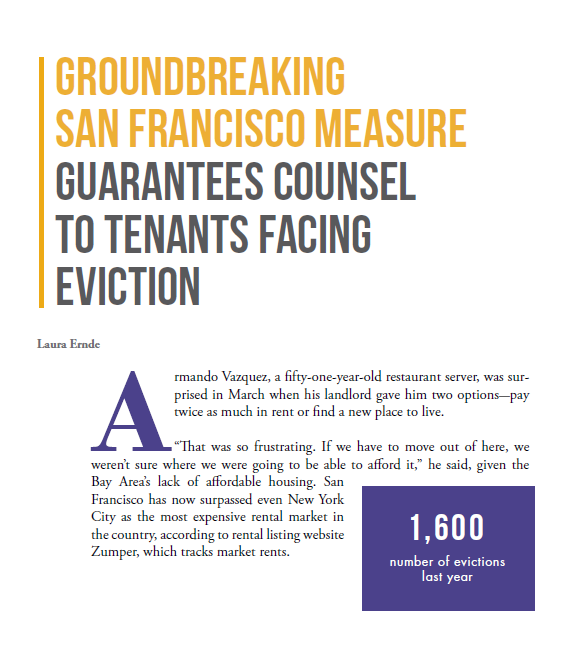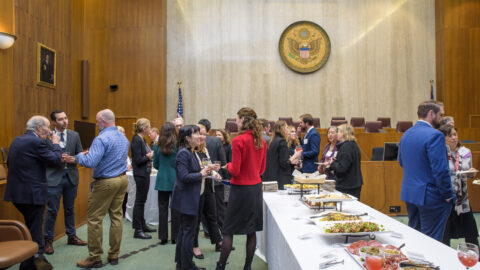
Armando Vazquez, a fifty-one-year-old restaurant server, was surprised in March when his landlord gave him two options-pay twice as much in rent or find a new place to live.
“That was so frustrating. If we have to move out of here, we weren’t sure where we were going to be able to afford it,” he said, given the Bay Area’s lack of affordable housing. San Francisco has now surpassed even New York City as the most expensive rental market in the country, according to rental listing website Zumper, which tracks market rents.
Vazquez knew enough about the law to know that he had a good case, but he wasn’t getting any traction fighting the eviction on his own. It was only after he found a pro bono attorney through the Justice & Diversity Center (JDC) of the Bar Association of San Francisco that the landlord agreed to negotiate. As a result, Vazquez and his partner will stay in the rent-controlled Excelsior apartment they share with two other roommates for a $200-a-month increase in rent, totaling $2,500.
Tenant advocates say that success stories like this one could become the norm now that San Francisco voters approved Proposition F. The first-of-its-kind measure guarantees that every tenant facing an eviction proceeding will have the right to an attorney from the outset.
The measure puts San Francisco at the forefront of a growing national “right-to-counsel” movement that aims to provide litigants who face life-altering consequences in court the same representation that’s guaranteed to criminal defendants.
And although many questions remain about how the initiative will be implemented, tenant advocates are confident it will have a positive effect on the housing and homelessness problems, even if it can’t solve the intractable housing crisis.
Better outcomes for tenants
Vazquez’s case is typical of the landlord-tenant cases handled by JDC. Last year, with the help of pro bono attorneys, JDC handled 645 settlement conferences and provided 100 tenants with full-scope representation.
“It changes the entire tenor of a conversation when a lawyer steps up for someone who has been unrepresented,” said Gloria Chun, JDC Director and Managing Attorney.
A 2014 city budget analyst study found that 80-90 percent of tenants facing eviction were taken to court unrepresented.
Proposition F calls for full-scope representation within thirty days of an eviction notice or filing of an unlawful detainer action. A 2011 Harvard study found tenants who had lawyers throughout the entire eviction process did much better than people like Vazquez who received limited legal advice.
The city estimates that as many as thirty-five hundred tenants a year will be eligible for the free services. Mayor London Breed announced in early August that the city will earmark $5.8 million over the next two years to pay for the legal defense program. San Francisco currently spends $4.4 million a year on eviction-related services such as counseling, education, outreach and basic no-cost or low-cost legal services.
Tenant advocates say the city’s investment in legal counsel will save money in the long run. When people lose their housing, it can lead to a downward spiral-they can lose custody of their kids, lose their job, and wind up homeless or even in jail.
The goal of having legal representation isn’t necessarily to stave off eviction. Sometimes the tenant’s financial situation has changed and they just need more time or assistance to find a new place to live. Meanwhile, a lawyer can put tenants in touch with services that will help them find and keep stable housing, even if that means moving.
“This will not rewrite the law in terms of who wins and loses,” said Dean Preston, founder and executive director of statewide renters’ rights organization Tenants Together. “Sometimes time is just as valuable as money.” For example, a parent who is two months away from the end of the school year or someone awaiting eligibility for public housing.
Some of the program’s success will depend on whether tenants take advantage of the program. Right now, up to 38 percent of tenants don’t even bother to fight an eviction notice, Preston said. There’s little information on why the default rate is so high. Will more people go to court when they have a lawyer to represent them?
But Preston and others said one thing is almost certain- landlords will be less likely to pursue unlawful evictions in the first place.
That’s a major reason why Preston is so optimistic that the measure will help combat the city’s housing crisis. He believes that one of the most effective ways to help the housing crisis is by keeping people who are affordably housed in their rent-control homes.
“I think it’s going to have a huge impact and will do more to stop evictions since rent control,” he said. “This certainly won’t stop all evictions, but it will be a major deterrent to fraudulent evictions.”
A majority of city residents are renters and Chun pointed out that with rents on the rise, there’s more incentive for landlords to try to evict long-term tenants in order to raise rents. The number of evictions was about 1,600 last year, a 26 percent increase from 2010.
“This will go a long way in giving people a fighting chance to stay in their homes in San Francisco,” Chun said. “That’s huge for us right now. It’s only fair and just that both sides should have a lawyer when housing is a basic human need.”
Prop F critics complained that renters of all income levels, including the wealthy, will be able to take advantage of the free legal assistance.
But tenant advocates countered that eviction usually impacts people who can’t afford to hire a lawyer. And wealthy people will most likely hire their own lawyer to represent them, as happens in criminal cases.
Chun said the vast majority of people who come to JDC qualify for aid. Even those who are middle class often can’t afford to hire an attorney, she said.
More lawyers will need to be trained
The Mayor’s Office on Housing has a year to figure out how to implement the measure, which could involve setting up a new organization or outsourcing the work to an existing group.
The Eviction Defense Collaborative currently acts as a clearinghouse for people seeking help with evictions. The San Francisco nonprofit sees about 90 percent of those who respond to an eviction notice, said Managing Attorney Carol Bettencourt.
Bettencourt works with a number of other local agencies, including JDC to provide legal assistance. But there simply aren’t enough lawyers to go around.
“Everyone is at capacity,” she said.
It’s a specialized area of law, with an interplay between state laws and local rent ordinances. There can be federal regulations as well if the case involves subsidized housing. But it doesn’t take very long for attorneys to become experienced because the cases go so quickly through court.
National perspective
Prop F also has national implications for those who are tracking the “right to counsel” movement, also known as “Civil Gideon” after the Gideon v. Wainwright decision that established the right to have a lawyer in criminal cases.
“It’s impossible to overstate how significant this is because housing is so critical,” said John Pollock, coordinator of the National Coalition for a Civil Right to Counsel. “A hundred years from now we’ll be shocked that we ever let people lose their housing.”
While some jurisdictions outside San Francisco have established the right to counsel in vital areas such as child custody and contempt for failure to pay child support, San Francisco and New York are the first two jurisdictions to recognize the necessity of having a lawyer to protect housing rights. The landlord-tenant relationship is fraught with what Pollack termed an “extreme imbalance of power.”
The scale of the problem is much larger in New York City, which has about 125,000 evictions a year. Its right-to-counsel law, passed last year, will be phased in over five years to provide lawyers for all low-income residents who come to housing court. Already, after the city increased funding for legal assistance to tenants, the number of evictions dropped 25 percent in two years. Filings dropped as well, Pollock said.
San Francisco’s effort was unique because it used the ballot initiative process, Pollock said.
“We’ve achieved quite a lot but we have a long way to go,” Pollock said.
About the author:
Laura Ernde is a San Francisco-based communications consultant. She has covered legal affairs for more than a decade, as a journalist and former editor of the California Bar Journal.




